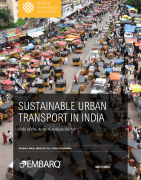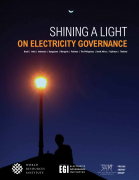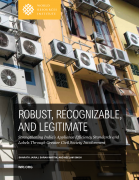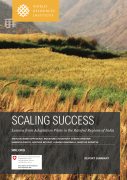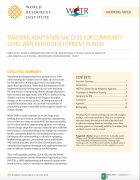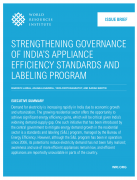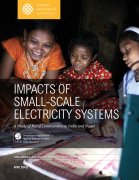Publications
WRI is committed to producing high-quality research, including reports, working papers, issue briefs, and fact sheets. Our publications are subject to peer review, and are held to traditional "academic" standards of excellence, such as objectivity and rigor.
All of our publications are available to download. You may obtain hard copies of select WRI reports at no charge (except shipping and handling) through our print publications catalog.
Subscribe to get notified of new publications or get the RSS feed.
-
Tracking Adaptation Success for Community Level Watershed Development in India
by -This working paper presents a joint effort by the World Resources Institute and the Watershed Organisation Trust (WOTR), a WSD implementing and research organization based in Pune, India, to develop an adaptation monitoring and evaluation (M&E) or tracking system to track success of WSD...
-
Prosumers in Bengaluru
by -The City of Bengaluru in the Indian state of Karnataka is making progress on rooftop solar PV installations, mainly through its utility implemented net-metering program. Yet, much more needs to be done if the state is to reach its 400 MW rooftop solar target by 2018. This working paper provides...
-
The Future Electricity Grid
by -Renewable energy (RE) is growing worldwide, with a six-fold increase in non-hydro renewables over the last decade from 85 to 657 gigawatts (GW). This report reviews the key trends that explain growth in RE, and highlights how they are challenging decision making in countries such as Brazil,...
-
Strengthening Governance of India's Appliance Efficiency Standards and Labeling Program
by -This issue brief examines how improved governance can help make India’s appliance efficiency standards and labelling program more successful. We focus particularly on standard setting, program implementation, and monitoring and verification through the lens of transparency, accountability,...
-
Impacts of Small-Scale Electricity Systems: A Study of Rural Communities in India and Nepal
by -This study assesses and compares the benefits of electricity service to households and small enterprises from microgrids, solar home systems (SHS), and the national grid in select rural communities in India and Nepal. Electricity access, in general, leads to reduced kerosene use, more time spent...
-
Assessing the Impact of Karnataka Electricity Regulatory Commission’s Open Access Order for Solar Power Generators in Karnataka
by -On 18 August 2014, the Karnataka Electricity Regulatory Commission (KERC) passed order number S/03/01 called ‘Wheeling Charges, Banking Charges & Cross Subsidy Surcharge for Solar Power Generators’, whereby all solar power generators in the state who achieved Commercial Operation Date (COD)...
-
Aggregating Demand for Corporate Rooftop Solar Installations: Lessons from the Collaborative Solar PV Procurement Project
by -WRI India and Confederation of Indian Industry (CII) through the Green Power Market Development Group (GPMDG) initiative attempted to aggregate energy demand from six corporate buyers in Bengaluru—Coca Cola, Infosys, IBM, Cognizant, Philips and Bangalore International Exhibition Center (BIEC)....
-
Scaling Success
by -This report helps policy makers, practitioners and funding agencies identify emerging adaptation good practices and the conditions necessary for scaling up those good practices to achieve adaptation success at scale.
...
-
Robust, Recognizable, and Legitimate
by -Residential use accounts for 14 percent of global energy consumption. Appliance standards alone could achieve 17 percent energy reductions in the residential sector. Although appliance efficiency standards and labeling programs (AES&L) aim to influence consumer behavior, consumers and civil...
-
Shining a Light on Electricity Governance
by -Shining a Light on Electricity Governance highlights the work and specific outcomes of the EGI network since the initiative’s inception in 2003.
-
Sustainable Urban Transport in India
by , e -This paper examines the role the auto-rickshaw sector can play in promoting sustainable urban transport in India. It develops a policy vision for this sector and presents recommendations on reforms to address sustainability challenges.
...
Páginas
- « first
- ‹ previous
- 1
- 2
- 3
- 4

